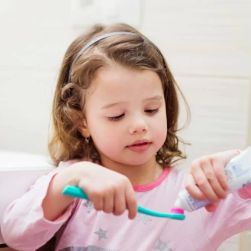When Should Children Start Brushing Their Teeth, and How Can Parents Assist Them?
Introducing children to proper oral hygiene from an early age sets the foundation for a lifetime of healthy habits. As soon as that first tiny tooth appears, it’s crucial for parents to understand the significance of early dental care. In the United States, pediatric dental guidelines recommend that dental hygiene should begin with the eruption of a child’s first tooth, typically around six months. This article from Dentistry Toothtruth (https://dentistry-toothtruth.com) provides guidance on when children should start brushing their teeth and how parents can actively assist them during this important developmental phase.
The Ideal Age to Start Brushing
According to the American Dental Association, children should start brushing their teeth as soon as their first tooth emerges. This is usually around six months of age, but can vary somewhat. Starting early not only helps in preventing cavities from forming but also helps children get accustomed to the routine of teeth brushing. Research indicates that children who develop good dental habits early in life are more likely to maintain those habits into adulthood. Thus, it’s essential that parents introduce brushing in a fun and engaging manner.
Choosing the Right Tools
One crucial aspect of teaching children how to brush effectively involves providing them with the proper tools. For infants, parents should use a soft infant toothbrush or a damp washcloth to gently clean the baby's teeth and gums. Once more teeth appear, transitioning to a child-sized toothbrush with soft bristles is recommended. The recommended toothpaste, according to the American Pediatric Dental Association, should be a smear of fluoride toothpaste the size of a grain of rice until age three. Afterward, it can be increased to a pea-sized amount. Providing the right brushing tools tailored to a child’s age and developmental stage is vital in promoting effective oral hygiene.
Parental Involvement and Supervision
Active involvement from parents is key in teaching children proper brushing techniques. Initially, parents should brush their children's teeth to model proper technique, gradually transitioning to guiding their child’s hands on the brush. It's crucial for parents to supervise the brushing process until the child is about 8 years old to ensure they are brushing effectively and not swallowing toothpaste. Pediatric dental experts suggest that parents engage in positive reinforcement to encourage consistency and to make the process enjoyable rather than a chore.
Strategies to Motivate Children
Establishing a fun, routine-oriented approach can motivate children to brush regularly. Incorporating games, songs, and storytelling can make brushing an exciting adventure. Parents might consider setting a timer or playing a two-minute song that cues when brushing should start and stop. Some parents also find success in using reward charts to track consistent brushing, fostering a sense of accomplishment in children. Such techniques are particularly effective in nurturing enthusiasm for daily oral care.
Common Challenges and Solutions
Many parents encounter challenges when encouraging their children to brush regularly. Common issues include resistance due to the unfamiliar sensation in the mouth, or negative reactions to certain toothpaste flavors. It's vital for parents to patiently address these challenges by introducing different toothbrush designs or toothpaste flavors until they find ones that suit their child. Discussions about why brushing is important, paired with consistent and gentle encouragement, often mitigate resistance and help establish enduring habits. Moreover, visiting the dentist regularly as a family can reinforce the importance of oral health and demonstrate its long-term benefits.
In conclusion, starting dental hygiene early by introducing brushing as soon as the first tooth appears is crucial for a child's oral health. Parents play an essential role in guiding and motivating their children to adopt these healthy habits. With the right tools, engaging strategies, and consistent support, parents can instill lifelong dental hygiene practices in their children. Visit our Dentistry Toothtruth site for more expert dental advice and tips aimed at ensuring comprehensive oral health for the entire family.



